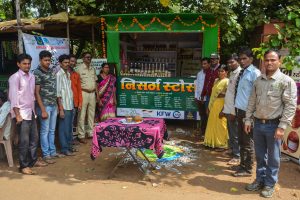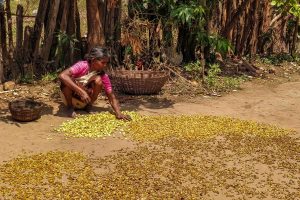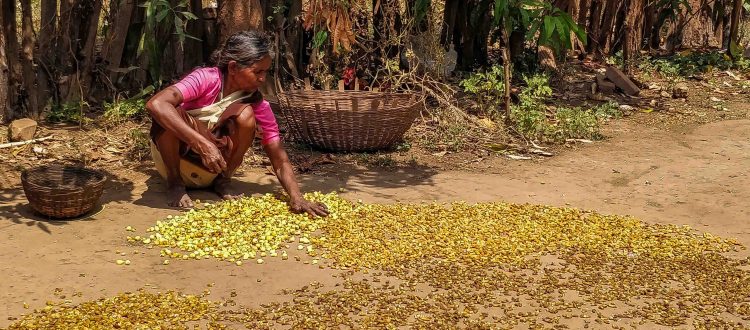In Tiger Country There is a Cookie with a Twist
Scanning through the display in a local bakery at Rampuri, Maharashtra, something unusual caught my eye. I knew about the famed local brew ‘mahua’ but never imagined it to be, also a cookie. By the time I could lift up my eyes to enquire, Meenabai was already handing me out one of the homemade biscuits. As I took my first cautious bite, she was explaining how this is a non-alcoholic product, despite what I was thinking. Sweet but with a raw texture that lingers on, I have never had something like this before. Now that I had downed one of the cookies, I wanted more!
A sustainable and self sufficient business
Meenabai Shivashankar, the woman behind these biscuits was also the representative of the Savitri Self Help Group (SHG), a local committee that has committed to developing such sustainable products from locally sourced raw materials. Mahua (Madhuca longifolia) is a tropical tree, found largely in the central Indian landscape. Mahua flowers and fruits are important non-timber forest products (NTFPs) for locals. While its fruit is edible, its flowers are fermented and processed into country liquor.

Nisarga Store BRM
Supported by Wildlife Trust of India (WTI) in the initial phases, these SHGs have come up with a variety of products like mahua soaps, mahua oil (used in cooking, body massage and lighting), mahua based squash and pickles. From 2018 onwards, each of these SHGs have been earning over INR 50,000 per month, selling these products in the local market and to curious tourists like me. A total of 133 such SHGs have come up since 2017, spanning across 44 villages in and around the Nagzira Navegaon Tiger Reserve (NNTR). Two such SHGS have even won the Hirkani Award from the Maharastara Skill development Corporation with prize money worth INR 50,000.
Connecting people and wildlife
So why take the initiative at all? Locals have always had a stable way of life. In the NNTR landscape, the economy had been completely dependent on agriculture and NTFP products like mahua. However, over the past decade, the forest cover has been diminishing and this has directly led to increase of human-animal conflict, especially tigers. This is why Wildlife Trust of India had stepped in with support from IUCN. Coming up with alternative livelihood is one of the best way to reduce the anthropogenic pressure on the forests. As Mr. Ranteke adds “We don’t need to go inside the forest anymore for NTFP collection and we are happy to earn money from home based bakery which has especially been helpful in the pandemic situation. Products like rab, pickle, biscuit etc. prepared from mahua have high iron content, also adding to its selling point. The bakery business has become a good source of income for 200 women living in the fringes of the forests and with little resources. We planned to expand our enterprise with the prize money”.

Ms Raveena Tandon innaugurating the Nisarg store at SGNP Mumbai
Apart from mahua based products, WTI, along with the Centre of Science for Villages, Wardha and Vigyan Sabha Kendra, Madhya Predesh have been training villagers on sustainable bee keeping, and crafts made from locally sourced raw materials. On the 25th of September, 2018, a ‘Van Dhan’ souvenir shop was set up at Sanjay Gandhi National Park in Mumbai. It was launched to sell various NTFP products prepared by SHG members from across the state. The shop was inaugurated by Bollywood celebrity Ms. Raveena Tandon, also the Brand Ambassador of Sanjay Gandhi National Park (SGNP). Similar Nisarga stores at NNTR and TATR also provided a platform for the project beneficiaries to market their products and fulfill capital requirements. From 27th June 2018 to 31st December 2021, beneficiaries of NNTR earned a total sum of INR 1,78,795/- and beneficiaries of TATR earned a sum of INR 65,651/- via product sale.

Mahua flower procesing_Madhumay Mallik
Conservation is about people
Successful conservation goes hand in hand with human wildlife co-existence. WTI under its Central India Tiger Corridor Securement Project has been working with communities and Governments to facilitate unhindered tiger movement across NNTR-TATR corridors connecting forest patches, regulating wildlife movement and fulfilling anthropogenic needs of fringe villages. Vocational trainings as a part of alternate livelihood to local communities residing in the fringes is a step to reduce human large carnivore conflict and to ensure long term presence and movement of tigers in tiger corridors of central India. Between 2017 and 2020, at least 40% of human-tiger conflicts have been resolved without requiring a capture. This has also extended to 40% of cases involving other wildlife, not requiring any intervention, thus adding to a better co-existence in this dynamic landscape. It certainly was an eye-opening experience how willingness on part of the locals and a bit of support from NGO’s like WTI can help a whole community. If mahua biscuits can help save lives, we are certainly living in a world full of possibilities!
____________________________________________
Written by Dr. Mahendra Bhojram Raut, our sociologist working in NNTR corridor.
Edited by Madhumay Mallik.









